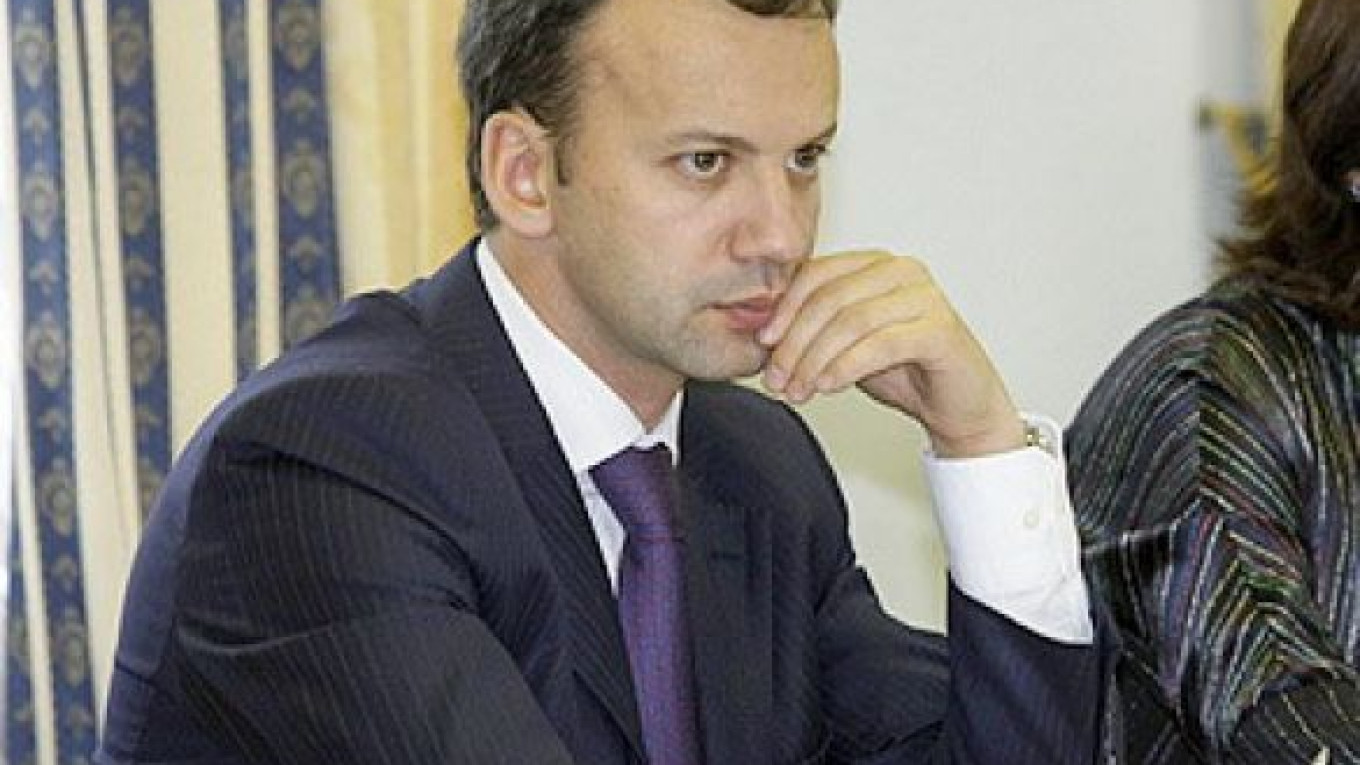In an attempt to squash media reports and assure investors, Deputy Prime Minister Arkady Dvorkovich said Tuesday that he had no plans to leave government and intended to help guide the country's economic course at least until the next presidential election in 2018.
Dvorkovich, speaking at a news conference dedicated to the first anniversary of the appointment of the Cabinet, which saw him promoted from Kremlin aide to deputy prime minister, said he "doesn't have a desire" to leave Prime Minister Dmitry Medvedev's government before its term ends.
"I knew that I would have to work six years, if I worked well and wasn't fired," Dvorkovich said, adding that he wouldn't leave by his own will.
Dvorkovich, who oversees the fuel and energy sector and is embraced by the foreign and Russian business community for his liberal-leaning policies, found himself answering questions about his future a day after Federal Guard Service officers reportedly blocked his car from entering Vladimir Putin's residence in Sochi, where the president is on a working vacation. RBK Daily newspaper reported Tuesday that Dvorkovich name had not been on the list of approved guests and that his aides had been forced to resolve the matter.
Dvorkovich, however, denied that the incident had occurred.
Medvedev's Cabinet has come under fire recently from lawmakers and analysts, who accuse it of failing to enact the policies needed to bolster the country's sagging economy. Former Finance Minister Alexei Kudrin called the government's performance "disappointing" during a meeting with a State Duma panel on Monday.
Fears about a recession are growing as the economy shows troubling signs of stagnation. The economy expanded by an annual 1.6 percent in the first quarter, the Federal Statistics Service said Friday. The Economic Development Ministry in April lowered its GDP forecast to 2.4 percent for the year, down from an earlier 3.6 percent.
Medvedev sought to ease jitters this week, telling the Komsomolskaya Pravda that the economy needs a growth rate of 4 percent to 5 percent and the current situation is "more or less acceptable."
Dvorkovich said that the economy, which is heavily dependent on oil, would get a boost via a slight year-on-year growth in crude production in 2013. "There is no reason to expect a contraction," Dvorkovich said.
With the government looking to liberalize the liquified natural gas exports, Dvorkovich said this would be achieved after exports such as Rosneft and Novotek reach agreements with Japan, South Korea and China. He said he expects the agreements to be signed this year.
Dvorkovich also said that an upcoming Russia-EU summit in Yekaterinburg, which will take place June 3, would send a "political signal" to the European Union about Russia's desire to boost energy cooperation. He said the summit, chaired by Putin, would discuss energy issues "in detail." He did not elaborate.
While Europe buys almost 30 percent of its gas from Russia, Gazprom, the country's gas monopoly, reported recently that its net profit declined by 15 percent and sales to the EU fell by about 9 percent. The situation was a result of discounts that European governments were able to get from Gazprom due to the competition from U.S. shale gas producers.
European countries also are currently looking for shale gas development as an alternative to Russian supplies.
Dvorkovich said that he understood the desire of European countries to extract gas at home but he hoped that "ecological issues" would be taken into an account.
Some analysts have warned that the extraction of shale gas might damage the environment and the gas wells can produce large amounts of methane, a potential greenhouse gas.
Contact the author at a.bratersky@imedia.ru
A Message from The Moscow Times:
Dear readers,
We are facing unprecedented challenges. Russia's Prosecutor General's Office has designated The Moscow Times as an "undesirable" organization, criminalizing our work and putting our staff at risk of prosecution. This follows our earlier unjust labeling as a "foreign agent."
These actions are direct attempts to silence independent journalism in Russia. The authorities claim our work "discredits the decisions of the Russian leadership." We see things differently: we strive to provide accurate, unbiased reporting on Russia.
We, the journalists of The Moscow Times, refuse to be silenced. But to continue our work, we need your help.
Your support, no matter how small, makes a world of difference. If you can, please support us monthly starting from just $2. It's quick to set up, and every contribution makes a significant impact.
By supporting The Moscow Times, you're defending open, independent journalism in the face of repression. Thank you for standing with us.
Remind me later.


